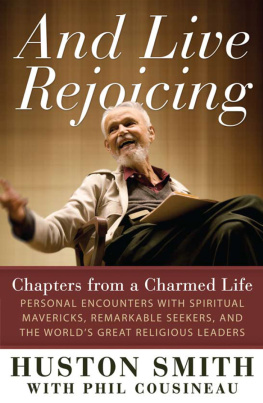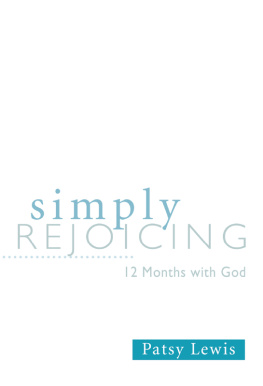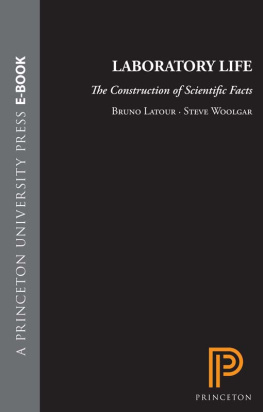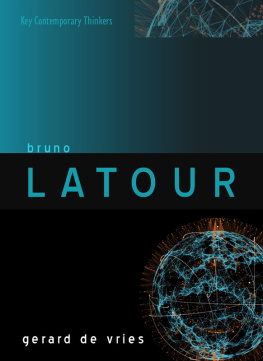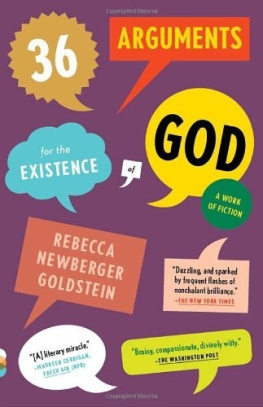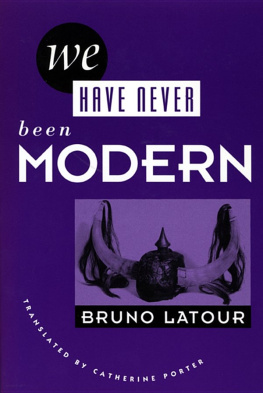Latour - Rejoicing: Or the Torments of Religious Speech
Here you can read online Latour - Rejoicing: Or the Torments of Religious Speech full text of the book (entire story) in english for free. Download pdf and epub, get meaning, cover and reviews about this ebook. year: 2013, publisher: Wiley, genre: Religion. Description of the work, (preface) as well as reviews are available. Best literature library LitArk.com created for fans of good reading and offers a wide selection of genres:
Romance novel
Science fiction
Adventure
Detective
Science
History
Home and family
Prose
Art
Politics
Computer
Non-fiction
Religion
Business
Children
Humor
Choose a favorite category and find really read worthwhile books. Enjoy immersion in the world of imagination, feel the emotions of the characters or learn something new for yourself, make an fascinating discovery.

Rejoicing: Or the Torments of Religious Speech: summary, description and annotation
We offer to read an annotation, description, summary or preface (depends on what the author of the book "Rejoicing: Or the Torments of Religious Speech" wrote himself). If you haven't found the necessary information about the book — write in the comments, we will try to find it.
Latour: author's other books
Who wrote Rejoicing: Or the Torments of Religious Speech? Find out the surname, the name of the author of the book and a list of all author's works by series.
Rejoicing: Or the Torments of Religious Speech — read online for free the complete book (whole text) full work
Below is the text of the book, divided by pages. System saving the place of the last page read, allows you to conveniently read the book "Rejoicing: Or the Torments of Religious Speech" online for free, without having to search again every time where you left off. Put a bookmark, and you can go to the page where you finished reading at any time.
Font size:
Interval:
Bookmark:

Rejoicing
polity
65 Bridge Street
Cambridge CB2 1UR, UK
350 Main Street
Malden, MA 02148, USA

Rejoicing or the torments of religious speech: that is what he wants to talk about, that is what he cant actually seem to talk about: its as though the cat had got his tongue; as though he was spoilt for choice when it comes to words; as though it was impossible to articulate; he cant actually seem to share what, for so long, he has held so dear to his heart; before his nearest and dearest, he is forced to cover up; he can only stutter; how can he own up to his friends, to his colleagues, his nephews, his students?
He is ashamed of not daring to speak out and ashamed of wanting to speak out, regardless. Ashamed, too, for those who dont make it any easier for him, thrusting his head underwater while claiming to rescue him, or, instead of throwing him a lifebuoy, throwing words as heavy as a mooring buoy at him. Weighted with lead, thats it theyve weighted him with lead. Yes, he goes to mass, and often, on Sunday, but it doesnt mean anything. Alas, no, it doesnt mean anything really; it cant mean anything anymore to anyone. There is no way of saying these things anymore, no tone, no tonality, no regime of speech or utterance. Its a twisted situation: he is ashamed of what he hears on Sunday from the pulpit when he goes to mass; but ashamed, too, of the incredulous hatred or amused indifference of those who laugh at anyone who goes to church. Ashamed that he goes, ashamed of not daring to say he goes. He grinds his teeth when he hears the things said inside; but he boils with rage when he hears the things said outside. All thats left for him to do is hang his head, weary, sheepish, before the horrors and misconceptions on the inside as well as before the horrors and misconceptions on the outside; its a double cowardice, double shame, and he has no words to express this, as though he were caught between two opposing currents, with the resultant clash leaving him whirling on the spot.
It is not of the religious that he wants to speak, not of the fact of religion. It is not of that vast stratum of institutions, law, psychology, rituals, politics, art, cultures, monuments and myths; of what for so long and in all climates took hold of human beings obliged to band together in conglomerations and attend to the things connecting them link and scruple being the two etymological senses of the word religio. The only thing he wants to reactivate is religious utterance, that very strange habit which developed over the course of history in the form of the Word, and which seems to him today to be so horribly confused. He doesnt want to study either the religious or religion still less, religions plural but only to disinter a form of expression that used to be so free and inventive, fruitful and saving in days gone by, but that now dries on his tongue whenever he tries to recover its movement, excitement, its structure. Why does what used to be so alive for him turn deadly boring whenever he endeavours to talk about it to others his children, for instance? What monstrous metamorphosis makes what once had so much meaning become absolutely meaningless, like a blast of words freezing on the lips of convicts in the Siberian cold?
What he would need to do, first and foremost, is be able to escape the menacing choice that vulgar common sense demands of anyone who sets out to talk about religion: But are you a believer or a non-believer? Hed like to able to answer: Obviously, Im speaking as a nonbeliever. But what hed mean by that word non-believer is someone who no longer believes in belief in any way, a true agnostic. Well, this belief in belief is something that those inside share with those outside its actually how they manage to distinguish the inside from the outside. If theres one thing both sides agree on, it is that this line can be drawn to mark their difference: You believe in it, I dont believe in it. How, then, can we say that it has absolutely nothing to do with belief? And especially not with believing in something, in someone, in the unnameable, the unprofferable G. How can we make it clear that belief or non-belief in G. makes no difference when it comes to talking about these things, to talking starting with these things? That that is not where the problem lies, that it actually entails mixing up categories, misdirecting ideas, committing an error of syntax, a blurring of genres? Yes, in these matters of religion (for brevitys sake, we can keep the word), belief in G. is absolutely not involved and, so, cannot define any kind of boundary between believers and non-believers, the faithful and the infidels. This fact already somewhat clouds the message he wants to get out before hes even begun. So its hardly surprising he has some trouble speaking, since to hear him you have to be an agnostic: neither indifferent nor sceptical, but quite determined, when it comes to talking about religion again, to do without the poison of belief. Whos up for such asceticism?
Especially when hed like to make such a statement without shocking? And without shocking twice: first the faithful, then the infidels; first the believers, then the non-believers, those on the inside and those on the outside. Hes well aware that anyone seeking to scandalize would be better off tying a millstone round his neck and throwing himself into a pond. If it was just a matter of choosing sides, it would be easy, everyone would line up in battle formation and he would bravely fire a shot as well as the next man. He would either return to the bosom of his holy mother the Church, bravely lambasting the non-believers and battling against indifference and heresy; or he would join the vast army of critics, railing against the sins of irrationality, against the resurgence of fundamentalisms (at the rear, safely away from the front line, as an arbiter, journalist or savant, he could also keep score). But thats just it: for him, there is no front. Neither belief nor non-belief distinguishes those who talk about religion from those who dont. That is why he doesnt want to scandalize either those who hold on to belief in belief in God as their most precious good, or those who preserve belief in non-belief in God as their most sacred right. An impossible task, of course, since they are at loggerheads: what satisfies one camp will necessarily shock the other.
Font size:
Interval:
Bookmark:
Similar books «Rejoicing: Or the Torments of Religious Speech»
Look at similar books to Rejoicing: Or the Torments of Religious Speech. We have selected literature similar in name and meaning in the hope of providing readers with more options to find new, interesting, not yet read works.
Discussion, reviews of the book Rejoicing: Or the Torments of Religious Speech and just readers' own opinions. Leave your comments, write what you think about the work, its meaning or the main characters. Specify what exactly you liked and what you didn't like, and why you think so.


